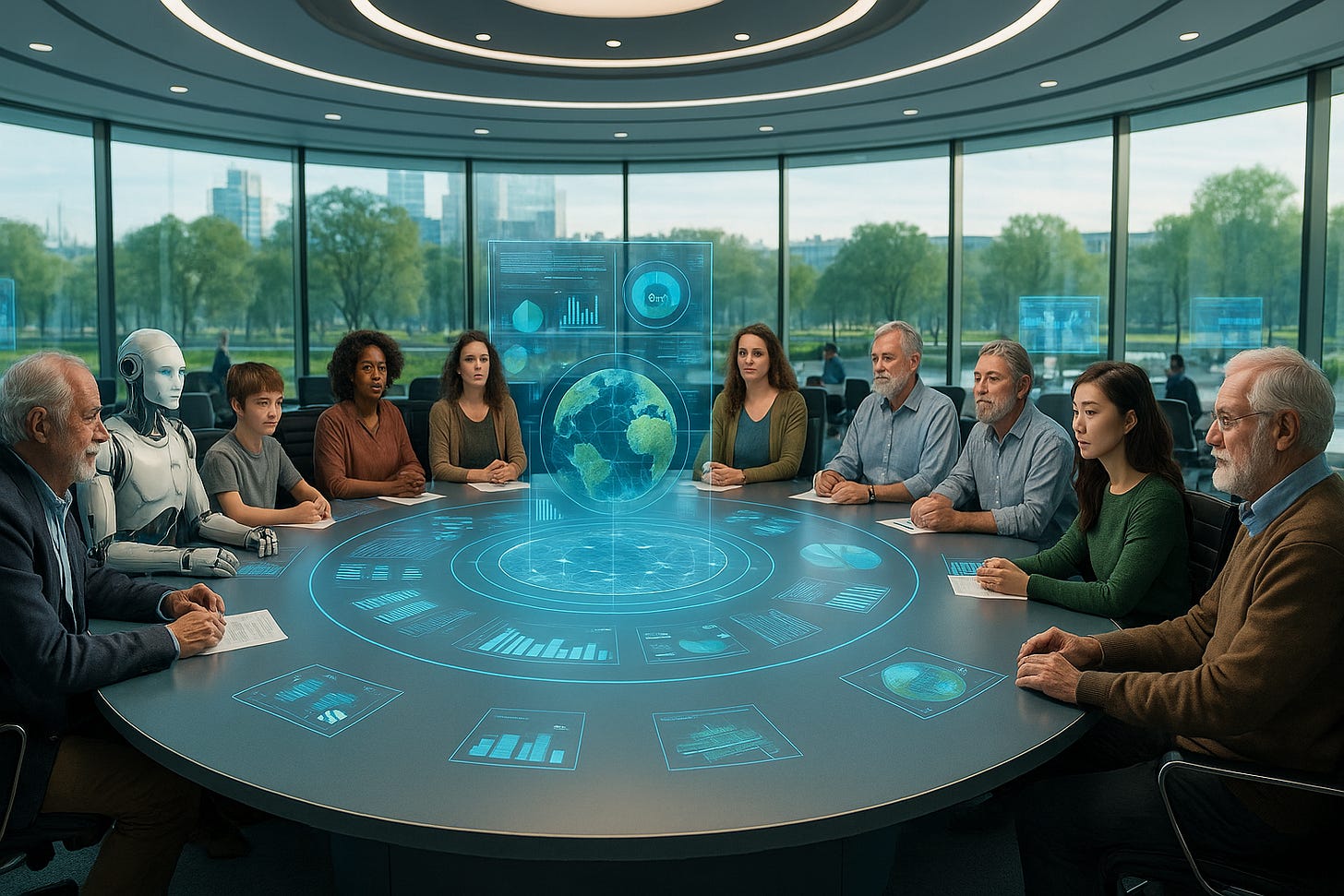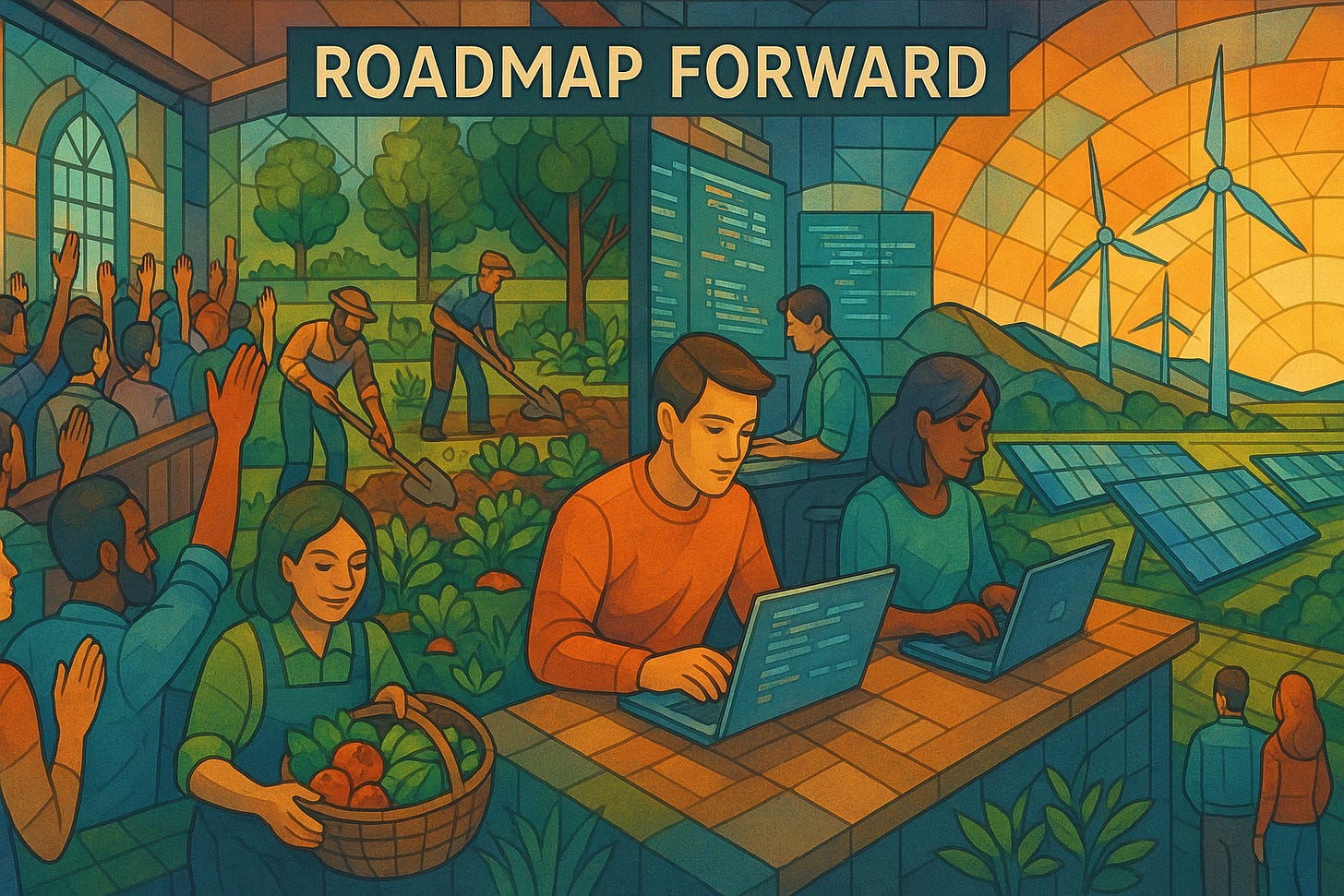Participatory Democracy Prevent Collapse in the Age of AI
“The choice isn’t between AI and collapse. It’s between clinging to wage-bound capitalism, or building a participatory resourceist democracy that makes technology the servant of humanity.”
Introduction: The Fear of Redundant Humanity
A growing chorus of writers and economists is sounding the alarm. They warn that the rise of artificial intelligence is not just about efficiency or convenience. It is about survival. If AI wipes out jobs, they say, demand will collapse. Without wages, people cannot buy what machines produce. The economy would then devour itself in a cycle of abundance without consumption, supply without demand.
One recent essay even compares humans to the horses of the industrial era. Once indispensable, horses became economically redundant once machines could pull carts, plow fields, and transport goods. The fear is that AI will do the same to people.
This anxiety is powerful. But it is also misplaced. What collapses is not humanity, but the economic system that ties human worth to wage labor. Resourceism, combined with participatory democracy, provides a vision of the future where abundance is shared, demand is not tethered to income, and technology liberates rather than displaces us.
“The real danger isn’t AI itself, but clinging to an economic system that ties human survival to wage labor.”
Say’s Law and Its Breaking Point
Economists still argue over a principle known as Say’s Law, often summarized as “supply creates its own demand.” The idea is simple. If I make shoes, I now have something to trade for food, housing, or services. In theory, everything produced eventually finds a buyer because production itself generates demand.
But Say’s Law has always been more fragile than it appears. As Keynes argued a century ago, markets can suffer from insufficient demand. If wages collapse or confidence erodes, production does not guarantee consumption. Shoes pile up unsold, fields of grain rot, factories sit idle.
This is the fault line exposed by AI. When jobs disappear, so does purchasing power. If millions lose work to code, the chain between supply and demand breaks. The problem is not technology. The problem is an economy that conditions access to life’s necessities on a paycheck.
Why Capitalism Cannot Save Us from AI
Capitalism rests on a promise. Every technological innovation will eventually create new jobs, often better ones, than those it destroys. The steam engine replaced field hands but created factories. The internet displaced travel agents but created software engineers.
But what if the innovator is no longer human?
AI is not only replacing tasks, it is generating new ones on its own. Drug discovery, content creation, logistics, and coding itself are no longer solely human domains. The comforting assumption that displaced workers can simply move into new sectors fails when those sectors are increasingly automated from the start.
Some economists argue that inheritance and altruism will cushion the blow. Wealthy parents will pass their fortunes down, giving younger generations the purchasing power to keep demand alive. But this is fantasy. Evidence shows that advanced economies do not practice widespread intergenerational altruism. Older generations consume much of their wealth before death and leave younger generations mountains of debt and ecological ruin.
“Capitalism tells us that innovation creates jobs. But what happens when the innovator is no longer human?”
Resourceism: A Paradigm Shift
This is where resourceism enters the picture. Resourceism is the idea that Earth’s resources are the common inheritance of all humanity. They are not the property of corporations or markets, but belong collectively to the species.
Under resourceism, goods and services are allocated based on human need rather than on profit. Housing, food, healthcare, education, and energy are guaranteed. Automation and AI are harnessed not to displace people but to maximize efficiency and reduce drudgery.
This breaks the link between survival and employment. In a resourceist framework, losing a job does not mean losing your home, your meals, or your ability to participate in society. Demand is defined not as money in hand, but as recognized human need. Supply serves those needs directly, coordinated through democratic systems.
Technology as Liberation, Not Threat
Automation under capitalism often feels like a threat. Machines mean layoffs, outsourcing, and consolidation of wealth. But under resourceism, technology becomes liberation.
History offers the analogy. The mechanization of agriculture reduced the need for farm labor. In a just system, this could have meant fewer hours bent in fields and more time for cultural and intellectual life. Instead, capitalism demanded that freed workers move into factories under harsher conditions.
The same fork in the road exists now. AI could either render masses of people redundant, or it could free humanity from the necessity of wage labor altogether. The outcome depends on the system in which AI operates. Resourceism ensures that abundance is shared rather than hoarded.
Participatory Democracy as the Safeguard
A resource-based system is only viable if it is democratic. Otherwise, it risks becoming technocracy or authoritarian control. Participatory democracy is the safeguard that ensures technology serves all rather than a ruling elite.
Resourceism envisions Resource Allocation Councils, composed of community representatives, experts, and citizens, who decide collectively how resources should be distributed. Real-time data on production, sustainability, and need informs their decisions.
This is not theoretical. Participatory budgeting has already been implemented in cities worldwide. Citizens’ assemblies have proven effective at tackling complex issues like climate change. These tools demonstrate that people are capable of deliberation and decision-making when given the structures to do so.
“Technology without democracy serves the few. Technology with participatory democracy serves us all.”
Why Collapse Is Not Inevitable
The author who fears demand collapse is right—under capitalism. But resourceism makes that collapse impossible.
Demand does not vanish because access to essentials does not depend on wages.
Generational fairness is preserved because no one’s survival is left to inheritance.
Supply is coordinated to meet real human needs rather than speculative markets.
In such a system, even if AI eliminates half of all jobs, no one goes hungry, unhoused, or untreated. Demand is sustained because need, not wages, drives allocation.
Counterarguments and Responses
Critics will say this is utopian. But so was democracy itself. Universal suffrage was once dismissed as fantasy. Today, it is a global standard.
Others argue that people will not work if not forced by wages. Yet history disproves this. People create, volunteer, and innovate constantly without monetary reward. Wikipedia, open-source software, caregiving, art, and science are all produced beyond the paycheck.
Still others insist that markets are more efficient than planning. But resourceism is not central planning in the Soviet sense. It relies on data, AI optimization, and democratic participation. It is adaptive, flexible, and transparent in ways old command economies never were.
A Practical Roadmap Forward
The transition to resourceism is not an overnight revolution. It is a process already underway in scattered experiments.
Universal basic income pilots have demonstrated the benefits of decoupling survival from employment.
Participatory budgeting gives citizens direct control over public resources in hundreds of cities.
Open-source collaboration shows how production can thrive outside profit incentives.
The roadmap involves expanding these initiatives, scaling them up, and integrating AI not as a job destroyer but as an abundance generator. Each step chips away at the dominance of wage labor and profit as the gatekeepers of survival.
The moral core of this shift is intergenerational responsibility. Instead of leaving younger people with debt, climate breakdown, and redundancy, we can leave them functioning systems that guarantee access, participation, and dignity.
Conclusion: From Fear to Agency
The fear that AI will make humans the horses of the 21st century is powerful but misplaced. It is not AI that makes people redundant. It is the economic system that equates human worth with wages.
Resourceism ensures that abundance serves humanity directly. Participatory democracy ensures that decisions about technology remain in the hands of people, not corporations or authoritarian rulers.
We stand at a crossroads. One path clings to capitalism, letting demand collapse as jobs vanish. The other path embraces resourceism, ensuring that technology liberates rather than displaces.



